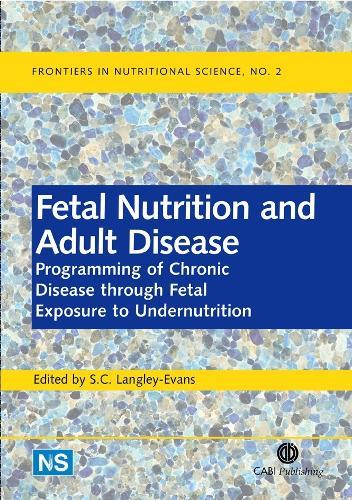Overview
Over the last decade epidemiological studies have suggested that the risk of coronary heart disease, stroke mortality and hypertension is, in part, related to the environment encountered during fetal life. In particular, maternal undernutrition during pregnancy has been highlighted as a causal factor in the long-term programming of disease risk. This book, which brings together the perspectives of leading researchers from Europe, the USA and Australasia, provides the reader with a detailed account of the evidence for and against the nutritional programming of human disease, and considers the biological basis of programming. The book addresses a topic of great current interest and controversy.
Full Product Details
Author: Simon Langley-Evans , Simon Langley-Evans
Publisher: CABI Publishing
Imprint: CABI Publishing
Dimensions:
Width: 17.20cm
, Height: 2.80cm
, Length: 24.40cm
Weight: 1.111kg
ISBN: 9780851998213
ISBN 10: 0851998216
Pages: 416
Publication Date: 02 August 2004
Audience:
General/trade
,
College/higher education
,
Professional and scholarly
,
General
,
Tertiary & Higher Education
Format: Hardback
Publisher's Status: Active
Availability: In Print 
This item will be ordered in for you from one of our suppliers. Upon receipt, we will promptly dispatch it out to you. For in store availability, please contact us.
Table of Contents
SECTION 1: PROGRAMMING THE FETUS 1: Introduction: Fetal programming of adult disease: an overview, Simon Langley-Evans 2: The nutritional basis of the fetal origins of adult disease, Jane Harding, University of Auckland, New Zealand 3: Fetal hypoxia, placental function and fetal development, Dino Giussan, University of Cambridge, UK, and David Gardner, University of Nottingham, UK SECTION 2: PROGRAMMING HUMAN DISEASE 4: The early life origins of cardiovascular disease: cohort studies, Janet Rich-Edwards, Harvard School of Medicine, USA 5: Associations between fetal growth and adult disease: are they causal? Rachel Huxley, Institute for International Health, Australia 6: Experimental models of hypertension and cardiovascular disease, Simon Langley-Evans 7: Associations between fetal and infant growth and non-insulin-dependent diabetes, Simon Langley-Evans 8: Programming of diabetes: experimental models, Claude Remacle, Brigitte Reusens and Luise Kalbe, Catholic University of Louvain, Belgium 9: Associations between human obesity and growth restriction during intrauterine life, Ariyeh Stein, Emory University, USA 10: Associations between maternal nutrition in pregnancy and later adiposity in animals, Bernhard Breier, Stefan Krechowec and Mark Vickers, University of Auckland, New Zealand 11: Renal disease and fetal undernutrition, Lori Woods, Oregon Health and Science University, USA 12: Perinatal determinants of atopic disease, Kitaw Demissie, Katherine Chung and Bijal Balasubramanian, University of Medicine and Dentistry of New Jersey, USA 13: Fetal programming of immune function, Thomas McDade and Christopher Kuzawa, Northwestern University, USA SECTION 3: BIOLOGICAL BASIS OF NUTRITIONAL PROGRAMMING 14: Programming in the pre-implantation embryo, Lorraine Young, Kevin Sinclair, University of Nottingham, UK, and Bill Rees, Rowett Research Institute, UK 15: Endocrine responses to fetal undernutrition: the IGF-Growth Hormone axis, Mike Symonds, David Gardner, Sarah Pearce, and Terrence Stephenson, University of Nottingham, UK 16: Impact of intrauterine exposure to glucocorticoids upon fetal development, Amanda Drake and Jonathan Seckl, University of Edinburgh, UK
Reviews
The book is written in an extremely readable style, which is credit to the many multi-national authors. It has some excellent chapters that raise current issues in modern medicine and public health. Katie Elwig, Journal of Human Nutrition and Dietetics.
Author Information
Tab Content 6
Author Website:
Customer Reviews
Recent Reviews
No review item found!
Add your own review!
Countries Available
All regions
|




